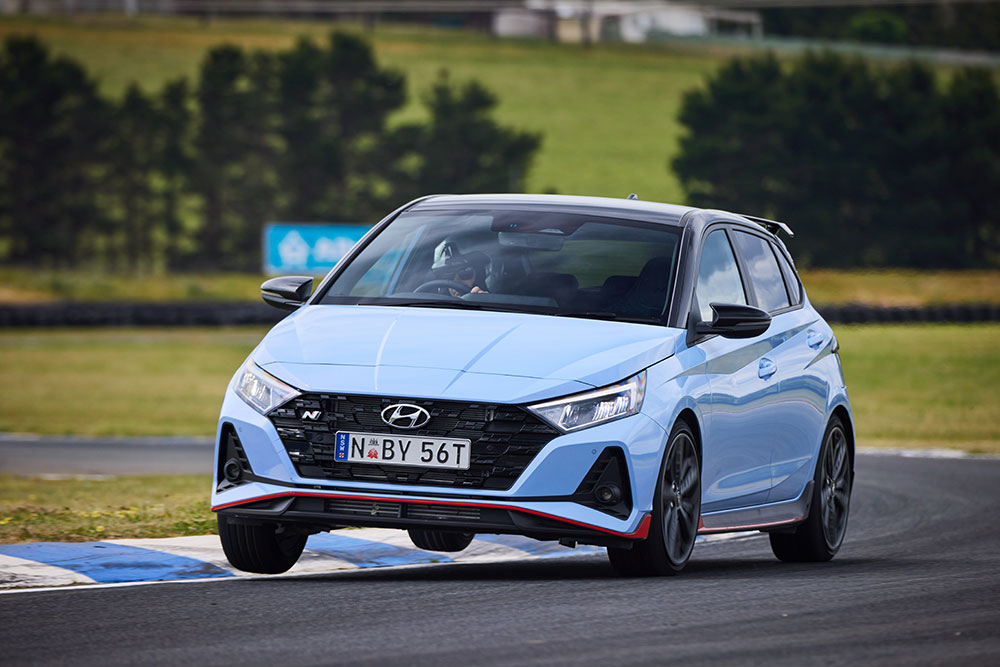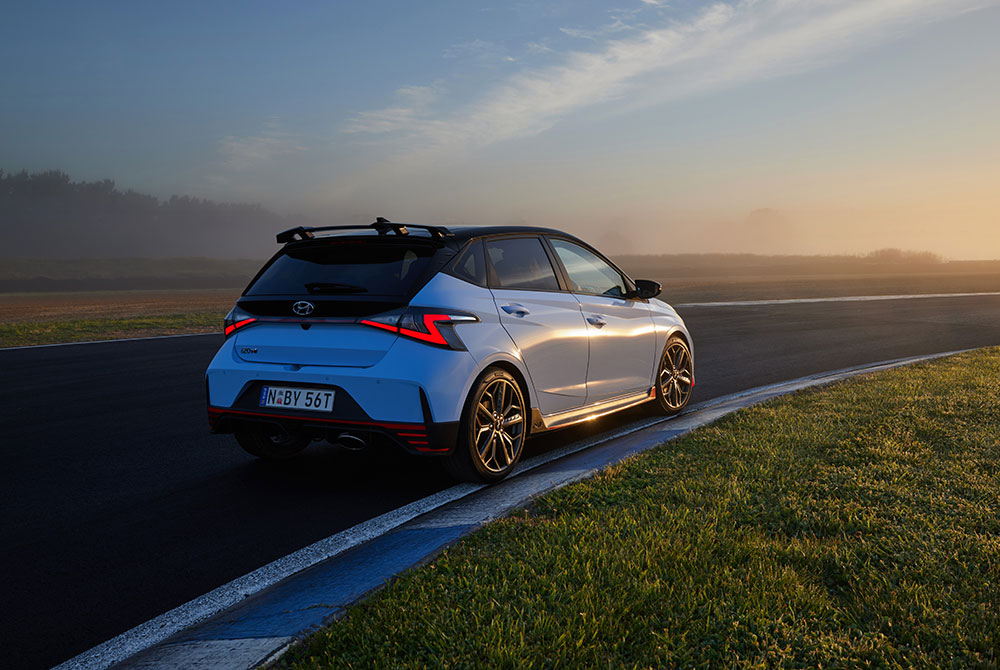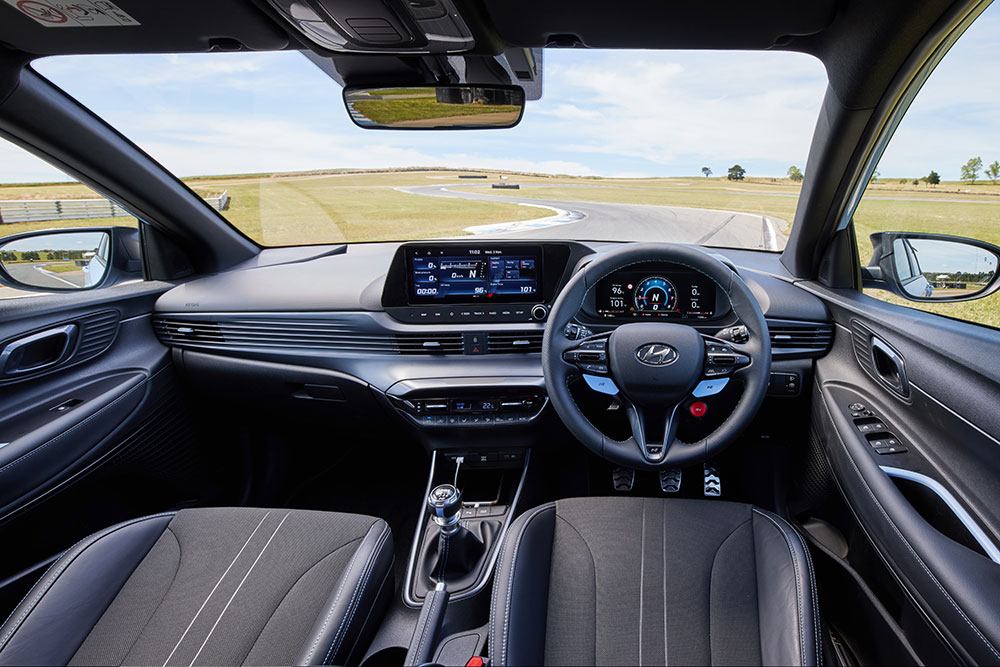Hyundai i20N review
Hyundai adds some spice to its small car range with the rally-inspired i20N.

The arrival of Hyundai’s first hot hatch in the light car segment, the i20N, was highly anticipated by Aussie driving enthusiasts teased by the performance and polish of the larger and more expensive i30N hatch, released in 2018.
As the latest offering from the Korean car maker’s N Performance Division, the i20N joins the highly acclaimed i30N, which was facelifted and added a sedan variant in 2021 and seems certain to adopt a cult following just like its bigger brother. It’s seriously that good.
Based on the company’s European light hatchback, the new N model has been comprehensively re-engineered to be track-ready straight out of the box.
Price-wise Hyundai has targeted established rivals like the Ford Fiesta ST and VW Polo GTi, pricing the single-specification i20N at a very attainable $32,490 MLP.
That’s just $200 upstream of the hot Ford and $400 below the German maker’s offering.
Meanwhile, Toyota’s GR Yaris, which is currently the hottest ticket in this division, is sold out for months into the future and even the entry model is around 52% more expensive than the feisty Korean.
While there’s clearly been plenty of attention paid to the i20N’s performance credentials, Hyundai has also ensured the hatch delivers on the everyday practicalities required of a daily driver, including an array of comfort, convenience, and connectivity features, plus a host of Smartsense safety technologies.
Among the standard inclusions are a 10.25-inch colour Supervision digital virtual instrument cluster, 10.25-inch satnav infotainment unit with Apple CarPlay and Android Auto, Bose eight-speaker audio and DAB+ radio, wireless smartphone charge pad, climate control air con, rear view camera, park sensors front and rear, tyre pressure monitoring, Smart key with push-button start and keyless entry front doors.
In addition to six airbags, the Smartsense suite includes blind-spot collision warning, forward collision avoidance assist (city/urban/pedestrian), driver attention warning, lane-keep assist, lane following assist, intelligent speed limit assist, and rear cross-traffic collision warning.
The compact hot hatch’s exterior has a suitably purposeful and sporty look inspired by the i20 WRC car, with N embossed side skirts and front lip spoiler (both with coloured inserts), aerodynamic front bumper, rear diffuser with integrated fog lamp, single ovoid exhaust outlet, gloss black dual level rear spoiler, black mirror caps, black chequered-flag grille insert and LED headlamps and DRLs.
Completing the picture are satin grey 18-inch alloys, shod with 215/40R18 Pirelli P-Zero HN rubber that Hyundai says were specifically developed in conjunction with the tyre maker to complement the car’s chassis geometry and suspension tune.

The performance focus continues in the cockpit with deeply bolstered low-slung cloth trimmed N-Sports bucket seats providing comfort and excellent support.
The neatly finished interior also boasts an N Sports leather-trimmed steering wheel with N mode buttons, and a leather-clad shift lever to enjoy flicking through the manual transmission’s six forward ratios.
A mechanical handbrake lever, also leather-bound, and alloy sports pedals round things out, with only a few hard looking plastic trims around the cabin hinting at the i20N’s more prosaic roots.
By light car standards, rear occupant space is quite reasonable and there’s 310 litres (VDA) of boot space, sufficient to cope with a couples’ weekly shopping chores, that expands to 1123 litres with the split-fold rear seat down.
A dual-height boot floor allows for a flat floor configuration for longer items or extra height for taller goods.
The heart that beats inside the i20N’s chest is a 16-valve Smartstream 1.6-litre, turbocharged and intercooled, direct-injection petrol engine that is Euro 6 emissions compliant, is tuned to run on standard 91RON unleaded fuel (minimum) and is even E10 compatible.
The under-square (stroke longer than bore diameter) engine develops maximum power of 150kW between 5,500 and 6,000RPM and peak torque of 275Nm, usefully spread from 1,750 to 4,500RPM with 304Nm available on over-boost.
Packing 123kW/tonne the fiery little beast outguns both the Ford and VW competition on power-to-weight ratio, also stopping the clock on the zero to 100km/h sprint ahead of both by 0.3 and 0.5 seconds respectively.
In fact, at an official 6.2 seconds, it’s not that far adrift of its bigger brother the i30N (5.9 sec, manual) whose list price starts at around $12,000 more.
On the road it’s a strong performer and feels properly quick with a meaty mid-range response.
Drivers have the choice of six selectable drive modes including two custom settings that allow for individual mapping of engine response, level of soundtrack from the active variable exhaust system, steering feel, stability control, and rev-matching function for gearshifts.
Other performance-focused accoutrements include a standard mechanical limited slip differential to manage power across the front axle during cornering and acceleration, reinforced chassis including additional welds to enhance rigidity, enlarged air intakes for radiator and intercooler, revised stiffer suspension bushings, a launch control system and a high-performance brake pack.

The latter wash off speed very efficiently and, as we discovered during a preview drive at Hyundai’s N-Festival Track Day at Queensland Raceway, hold up well to repeated track punishment.
Not surprisingly, the suspension tuning is heavily biased toward dynamic ability, which in turn means a noticeably firm ride.
It’s tolerably civilised by hot hatch standards, but sharper edges elicit an obvious thump from the undercarriage.
The i20N’s track-ready suspension tuning is a result of collaboration between the company’s European Technical Centre, its Korean proving ground at Namyang, and further honing at Germany’s famed Nürburgring race circuit.
The result is precise steering with good road feel, decent grip levels, a flat confident stance through corners and a communicative well-balanced chassis.
The i20N is happy making quick changes of direction, easy and intuitive to pedal quickly and encourages the driver to seek out winding roads for sheer enjoyment.
The N Road Sense system will even detect road signs indicating curves ahead and recommend switching to N mode.
Like the rest of the N performance range, which was recently expanded with the introduction of the Kona N, the potent little i20N packs a whole lot of fun into a compact format and is guaranteed to put a broad smile on any enthusiast driver’s face.
And, at such a budget-friendly price, the smiles will start even before leaving the showroom, which may make this N model the pick of a highly desirable bunch.
Key stats
- MLP: $32,490
- ENGINE: 1.6-litre T-GD-i turbo-petrol four-cylinder.
- ANCAP CRASH RATING: Not yet rated.
- FUEL CONSUMPTION (combined cycle, litres/100km): 6.9 (157g/km CO₂)
- FOR: Incredible bang for very affordable bucks, real little fun machine and very track capable, tech and safety.
- AGAINST: Spacesaver spare, smallish boot, firm ride, tyre/road noise on coarse chip surfaces.
Related topics
Things to note
The information in this article has been prepared for general information purposes only and is not intended as legal advice or specific advice to any particular person. Any advice contained in the document is general advice, not intended as legal advice or professional advice and does not take into account any person’s particular circumstances. Before acting on anything based on this advice you should consider its appropriateness to you, having regard to your objectives and needs.
Insurance Products (excluding Travel Insurance) are issued by RACQ Insurance Limited ABN 50 009 704 152 (RACQI) and arranged by RACQ Distribution Services Pty Ltd (RDS) ABN 35 116 361 650, AFSL 567130 and RDS' authorised representatives (including RACQ Operations Pty Ltd ABN 80 009 663 414, AR No. 234978 (RACQO)). Conditions, limits and exclusions apply.
Any advice provided by RDS and RACQO is general advice only and does not take into account your personal objectives, financial situation or needs and you will need to consider whether the advice is appropriate for you. Read the Product Disclosure Statement (PDS) before making a purchase decision on the product. You can also access our Target Market Determinations on this website.
RDS receives a commission from RACQI for the policies it arranges. RACQO receives fees paid for services it provides to RDS. Further details about remuneration are available on request prior to purchasing.
Banking and loan products issued by Members Banking Group Limited ABN 83 087 651 054 AFSL/Australian credit licence 241195 trading as RACQ Bank. Terms, conditions, fees, charges and lending policies apply. This is general advice only and may not be right for you. This information does not take your personal objectives, circumstances or needs into account. Read the disclosure documents for your selected product or service, including the Financial Services Guide and the Terms and Conditions, and consider if appropriate for you before deciding.
Except for RACQ Bank, any RACQ entity referred to on this page is not an authorised deposit-taking institution for the purposes of the Banking Act 1959 (Cth). That entity’s obligations do not represent deposits or other liabilities of RACQ Bank. RACQ Bank does not guarantee or otherwise provide assurance in respect of the obligations of that entity, unless noted otherwise.
RACQ Bank subscribes to the Customer Owned Banking Code of Practice which establishes higher standards than the law requires. The Code reflects modern consumer expectations and developments in approaches to issues such as consumer vulnerability, guarantors, and supporting customers through financial hardship. Please read our Customer Owned Banking Code of Practice page for more information.
RACQ Operations Pty Ltd (ABN 80 009 663 414 AR 000234978) and Members Travel Group Pty Ltd (ABN 45 144 538 803 AR 000432492) are acting as an Authorised Representative of the issuer of the insurance, Tokio Marine & Nichido Fire Insurance Co., Ltd. (ABN 80 000 438 291 AFSL 246 548). Any advice set out above is general in nature only, and does not take into account your objectives, financial situation or needs. Before purchasing any travel products, please consider the RACQ Travel Insurance Product Disclosure Statement (PDS) and the Target Market Determinations (TMDs) that apply to these products. Whilst the PDS outlines the Terms and Conditions of these products, the TMDs outline the intended class of customers that comprise the target market for these travel products. This will allow you to consider which products best suit your objectives, financial situation and needs and consider the products appropriateness to your personal circumstances. TMDs also outline matters involving the distribution and the review of these products. The PDS, Supplementary PDS and TMDs for each travel product can be found here.
